The demand for 3D imaging surgical solutions in Japan is expected to reach USD 13.3 billion by 2035, reflecting an absolute increase of USD 4.9 billion over the forecast period. The demand, valued at USD 8.4 billion in 2025, is expected to grow at a steady CAGR of 4.7%. This growth is primarily driven by the increasing adoption of advanced imaging technologies in surgical procedures, including orthopedics, neurosurgery, and cardiology, where precision and visualization are critical.
The breakpoint analysis for the demand for 3D imaging surgical solutions in Japan highlights two key phases of growth: a steady initial phase followed by a significant acceleration. Between 2025 and 2030, demand will grow gradually from USD 8.4 billion to USD 8.8 billion, marking a steady growth of USD 0.4 billion, representing a slower adoption phase as healthcare institutions begin to integrate 3D imaging solutions into their existing surgical processes. The demand in this period will primarily be driven by the need for more accurate diagnostic tools and precision in surgical procedures.
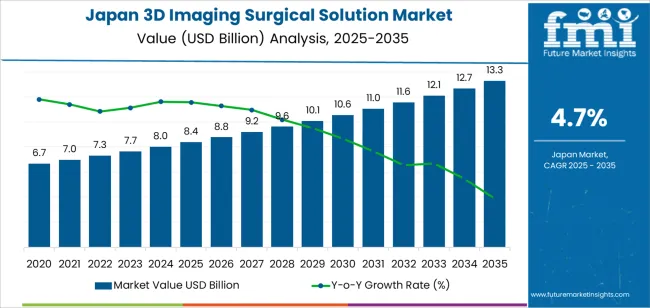
From 2030 to 2035, there is a clear breakpoint as the demand accelerates, with an expected increase of USD 4.5 billion, representing approximately 91.8% of the total growth. This rapid increase will be driven by several factors, including widespread advancements in 3D imaging technology, broader adoption across more surgical specialties, and the growing focus on patient-centered healthcare solutions. The key drivers during this phase include the expansion of minimally invasive surgeries and the integration of AI into imaging systems, which will offer real-time decision support to surgeons, improving both the efficiency and effectiveness of surgical procedures.
Between 2025 and 2030, the demand for 3D imaging surgical solutions in Japan is projected to grow from USD 8.4 billion to approximately USD 8.8 billion, adding USD 0.4 billion, which accounts for about 8.2% of the total forecasted growth for the decade. This period will see steady demand driven by the increasing integration of 3D imaging technologies in surgical practices, particularly in high-precision fields such as orthopedics and neurosurgery. The growing preference for minimally invasive procedures, which require precise visualization and planning, will further support the demand for these solutions.
From 2030 to 2035, the demand is expected to expand from approximately USD 8.8 billion to USD 13.3 billion, adding USD 4.5 billion, which constitutes about 91.8% of the overall growth. This phase will be marked by accelerated adoption, with continued advancements in 3D imaging technologies, including improved resolution, integration with AI-driven surgical planning, and the growing use of these solutions in a wider range of surgeries. As the demand for more effective and efficient healthcare solutions continues to rise, the adoption of 3D imaging surgical systems will become more widespread, particularly in the aging population’s healthcare needs.
| Metric | Value |
|---|---|
| Japan 3D Imaging Surgical Solution Value (2025) | USD 8.4 billion |
| Japan 3D Imaging Surgical Solution Forecast Value (2035) | USD 13.3 billion |
| Japan 3D Imaging Surgical Solution Forecast CAGR (2025-2035) | 4.7% |
The demand for 3D imaging surgical solutions in Japan is growing due to the increasing adoption of advanced imaging technologies in medical procedures. Japan has long been a leader in healthcare technology, and the integration of 3D imaging solutions is enhancing surgical precision, improving patient outcomes, and supporting less invasive surgical techniques. 3D imaging technology allows surgeons to visualize anatomical structures in three dimensions, providing more detailed and accurate views of the patient’s body during complex surgeries.
The aging population in Japan is a major driver of this demand, as older adults are more prone to conditions requiring surgical intervention. The rise in chronic diseases such as cancer, cardiovascular conditions, and orthopedic issues is further increasing the need for advanced surgical solutions. 3D imaging systems are particularly valuable for minimally invasive surgeries, which are becoming more common due to their advantages, including shorter recovery times, reduced complications, and improved overall patient satisfaction.
Japan’s focus on technological innovation in healthcare, along with ongoing investments in medical research and infrastructure, is propelling the growth of 3D imaging solutions. The integration of augmented reality (AR) and virtual reality (VR) with 3D imaging technologies is also contributing to enhanced surgical planning and navigation, making the technology indispensable for modern surgical practices. As Japan continues to prioritize healthcare advancements and improve surgical outcomes, the demand for 3D imaging surgical solutions is expected to grow steadily.
Demand is segmented by technology type, imaging solutions, end users, and region. By technology type, demand is divided into stereoscopy, auto-stereoscopy, volumetric display, holography, and anaglyphy. Based on imaging solutions, demand is categorized into 3D rendering, layout and animation, image reconstruction, 3D modelling, and 3D scanning. By end use, demand is segmented into hospitals, specialty clinics, and ambulatory surgical centers. Regionally, demand is distributed across Kyushu & Okinawa, Kanto, Kinki, Chubu, Tohoku, and the Rest of Japan.
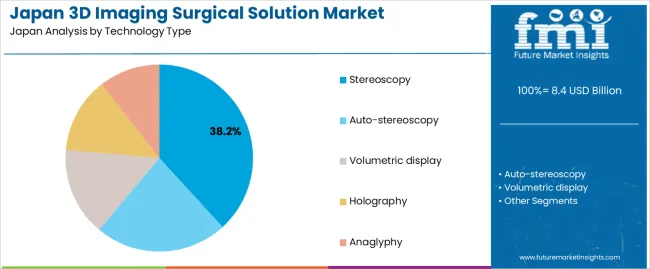
Stereoscopy, accounting for 38% of total demand, leads due to its ability to deliver enhanced depth perception, which is essential for high-precision surgical procedures. By presenting two offset images to mimic natural binocular vision, stereoscopy allows surgeons to better visualize anatomical structures during operations. This is particularly beneficial for intricate specialties such as neurosurgery, cardiovascular surgery, and orthopedics, where millimeter-level accuracy is required. Japanese hospitals favor stereoscopic systems because they improve surgical visibility, reduce error rates, and contribute to better patient outcomes. The country’s strong emphasis on medical precision, combined with widespread adoption of advanced imaging systems, reinforces stereoscopy as the preferred technology across surgical facilities. As surgical complexity increases and minimally invasive procedures expand, stereoscopy continues to serve as the most reliable and widely used 3D imaging format in Japan.
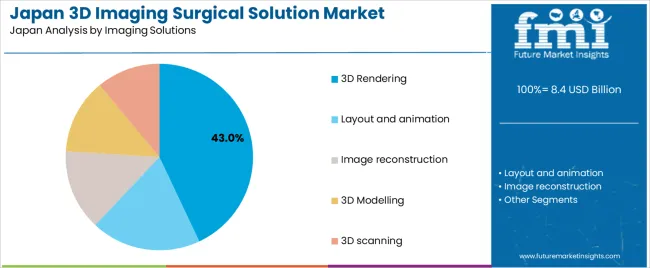
3D rendering, representing 43% of total demand, dominates imaging solutions because it enables highly detailed visualization of patient anatomy before and during surgery. Surgeons rely on 3D-rendered images to study complex structures, assess surgical pathways, and identify potential complications. These detailed visual models greatly enhance pre-operative planning, making procedures safer and more predictable. In Japan, where hospitals prioritize technology that improves precision, 3D rendering plays a central role in advanced surgical approaches, including robotic surgery and minimally invasive interventions. The ability of 3D rendering to integrate MRI, CT, and ultrasound data into a unified, realistic model further boosts its adoption. With Japan’s continuous advancements in imaging and diagnostic technologies, 3D rendering remains the most essential imaging solution in modern surgical workflows.
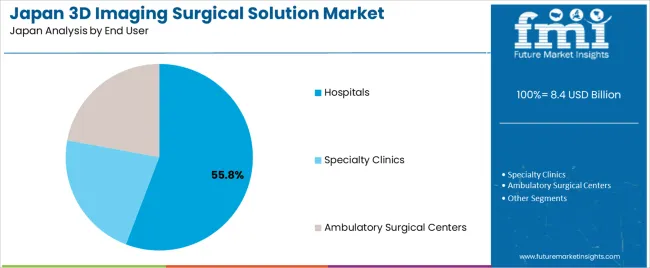
Hospitals, accounting for 55.8% of demand, lead due to their extensive use of 3D imaging technologies for complex and high-risk surgeries. Japanese hospitals invest heavily in advanced imaging systems to improve surgical precision, patient safety, and overall treatment efficiency. These facilities require sophisticated visualization tools for neurosurgery, cardiovascular procedures, cancer surgery, and orthopedics—fields where accurate anatomical representation is critical. Hospitals also conduct the majority of high-volume surgeries, driving consistent demand for high-quality 3D imaging systems. With Japan’s reputation for world-class medical infrastructure and rapid adoption of next-generation surgical technologies, hospitals remain the primary end users. The ongoing growth of minimally invasive techniques and robotic surgery further solidifies hospitals’ leading role in adopting 3D imaging surgical solutions across the country.
3D imaging surgical solutions offer features like volumetric imaging, real-time navigation, and integration with robotic systems, which align with Japan’s precision-medicine and digital-health ambitions. Key drivers include strong hospital infrastructure, the prevalence of complex surgeries (e.g., neurosurgery, cardiovascular), and increasing government funding for innovation. Restraints include high equipment costs, stringent regulatory and reimbursement protocols, and slower upgrades beyond major tertiary hospitals.
Why are 3D Imaging Surgical Solutions Gaining Popularity in Japan?
3D imaging surgical solutions are gaining popularity in Japan because they help surgeons navigate complex anatomies with higher precision and reduce procedural risk especially important given Japan’s ageing population and rising incidence of degenerative and cardiovascular conditions. Hospitals are upgrading operating rooms to hybrid and smart-OR configurations, and 3D imaging supports this trend by enabling better visualization, planning and execution. As patients expect shorter hospital stays and fewer complications, these technologies contribute to improved outcomes and lower long-term costs, making them attractive to high-end medical centres in Japan.
How are Technological Innovations Driving Growth of 3D Imaging Surgical Solutions in Japan?
Technological innovations are fueling growth in Japan by enhancing imaging quality, connectivity and surgical workflow integration. Developments such as high-resolution stereoscopic displays, intra-operative 3D mapping, augmented-reality overlays and seamless integration with robotics and navigation platforms enable more efficient and accurate surgeries. Japanese hospitals benefit from these innovations as they support advanced surgical specialties, reduce re-procedure rates and align with national digital healthcare strategies. The move toward networked operating rooms and data-driven surgical planning strengthens the business case for integrating 3D imaging solutions across high-volume centres.
What are the Key Challenges Limiting Adoption of 3D Imaging Surgical Solutions in Japan?
Despite promising uptake, there are several challenges limiting broad adoption in Japan. The high capital investment required for 3D imaging systems, hybrid OR retrofit and training can be prohibitive for smaller hospitals or clinics. Japan’s regulatory and reimbursement framework is complex, slowing roll-out of new technologies unless clear clinical and cost-benefit evidence is offered. Integration with existing systems and maintaining multidisciplinary workflow changes also pose operational hurdles. Finally, while tertiary hospitals adopt early, broader diffusion into regional or rural facilities remains slow, limiting saturation and slowing overall industry expansion.
| Region | CAGR (%) |
|---|---|
| Kyushu & Okinawa | 5.9% |
| Kanto | 5.4% |
| Kinki | 4.7% |
| Chubu | 4.2% |
| Tohoku | 3.7% |
| Rest of Japan | 3.5% |
The demand for 3D imaging surgical solutions in Japan is growing across regions, with Kyushu & Okinawa leading at a 5.9% CAGR. This growth is driven by advancements in medical technologies and a growing preference for minimally invasive procedures. Kanto follows closely at 5.4%, supported by the strong concentration of healthcare facilities and research institutions in cities like Tokyo and Yokohama. The Kinki region, including Osaka, shows a 4.7% CAGR, while Chubu records a 4.2% CAGR, both benefiting from the increased adoption of advanced surgical technologies. Tohoku and the Rest of Japan experience slower but steady growth, with CAGRs of 3.7% and 3.5%, respectively, as medical centers in these regions continue to invest in high-tech surgical equipment.
Kyushu & Okinawa is experiencing the highest demand growth for 3D imaging surgical solutions in Japan, with a 5.9% CAGR. This growth is primarily driven by the increasing investments in healthcare infrastructure and the adoption of advanced medical technologies in the region. Kyushu, with cities like Fukuoka, has become a hub for medical innovation, and the region’s healthcare facilities are increasingly adopting 3D imaging technologies to improve the accuracy and efficiency of surgical procedures.
The region’s hospitals are also seeing an increase in the number of complex surgeries, such as orthopedic and neurosurgical procedures, which benefit from the enhanced visualization provided by 3D imaging. As Japan continues to focus on healthcare improvement in rural areas, regional healthcare facilities in Kyushu & Okinawa are prioritizing the integration of cutting-edge surgical technologies. The increasing availability of these solutions is driving adoption across the region, further boosting demand for 3D imaging surgical solutions.
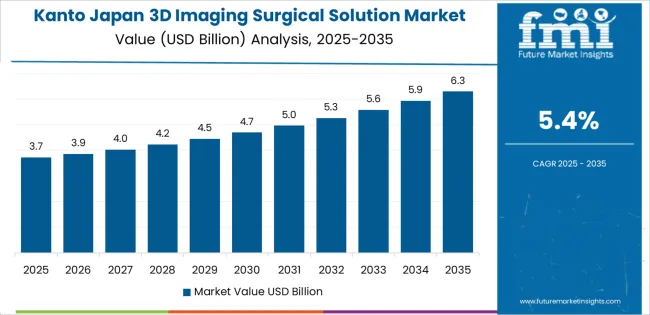
Kanto is witnessing strong demand for 3D imaging surgical solutions with a 5.4% CAGR. The region is home to Japan’s capital, Tokyo, and a significant portion of the country’s healthcare infrastructure, including research centers, hospitals, and medical universities. Tokyo is at the forefront of medical technology adoption, and the region has seen a growing number of healthcare facilities incorporating 3D imaging systems for precision surgeries.
The high density of healthcare facilities and leading medical institutions in Kanto has accelerated the use of 3D imaging in a variety of surgical specialties, including cardiovascular and minimally invasive procedures. The increasing demand for high-precision surgeries and the focus on enhancing surgical outcomes is a key factor driving the adoption of 3D imaging solutions in the region. As medical technology continues to advance in Kanto, the demand for 3D imaging solutions is expected to maintain strong growth, supported by both public and private healthcare investments.
Kinki, which includes the cities of Osaka and Kyoto, is experiencing steady demand for 3D imaging surgical solutions with a 4.7% CAGR. The region is a key medical and technological hub in Japan, and its healthcare sector continues to adopt innovative technologies to improve surgical precision and patient outcomes. As a center for medical research and development, Kinki has a high concentration of healthcare facilities that are investing in advanced surgical technologies such as 3D imaging systems.
The region’s emphasis on specialized medical care, particularly in fields such as oncology and orthopedic surgery, has increased the need for 3D imaging to assist in complex surgeries. The ongoing growth of private hospitals and surgical centers in Kinki, coupled with advancements in medical education, is further propelling the adoption of 3D imaging systems. As the healthcare sector in Kinki continues to innovate, the demand for 3D imaging surgical solutions is expected to maintain a steady pace.
Chubu is experiencing moderate growth in the demand for 3D imaging surgical solutions, with a 4.2% CAGR. The region, which includes cities like Nagoya, has a well-established healthcare system and is home to numerous medical institutions focused on improving patient care through technology. As surgical centers in Chubu adopt advanced imaging technologies, the demand for 3D imaging solutions in surgeries, such as orthopedics and neurosurgery, has increased.
Chubu's growing focus on medical technology innovation and patient-centric care is driving the integration of 3D imaging solutions into surgical procedures. While growth in Chubu is not as rapid as in other regions, the steady adoption of these technologies is contributing to an ongoing increase in demand. As the region continues to invest in healthcare infrastructure and advanced surgical solutions, 3D imaging will play a key role in enhancing surgical accuracy and patient outcomes.
Tohoku is experiencing moderate growth in the demand for 3D imaging surgical solutions, with a 3.7% CAGR. This growth is largely driven by the region’s efforts to rebuild and modernize its healthcare infrastructure following natural disasters. The increased focus on improving medical facilities in cities like Sendai is creating an environment where advanced surgical technologies, such as 3D imaging, are being adopted to enhance surgical outcomes and precision.
While Tohoku is more rural compared to other regions in Japan, there is a strong push to modernize healthcare systems and expand access to advanced medical technologies. The need for accurate and efficient diagnostic tools, particularly in complex surgeries like orthopedics, cardiology, and neurosurgery, is pushing the demand for 3D imaging systems. As the region continues to invest in upgrading its healthcare infrastructure and improving access to high-tech solutions, the demand for 3D imaging surgical technologies is expected to grow steadily, enhancing the quality of healthcare in the area.
The Rest of Japan, which includes smaller, more rural regions, is also seeing steady growth in the demand for 3D imaging surgical solutions, with a 3.5% CAGR. As healthcare facilities in these areas modernize and expand their capabilities, there is a growing adoption of advanced surgical technologies. The introduction of 3D imaging systems is helping to improve surgical precision and reduce recovery times, particularly in complex surgeries.
As regional hospitals and medical centers seek to provide high-quality care to residents in less urbanized areas, the demand for cutting-edge technologies like 3D imaging is rising. The Rest of Japan is increasingly investing in medical infrastructure and aiming to improve healthcare access for rural populations. While the pace of growth is slower compared to more urbanized regions, the ongoing investments in medical technology and the adoption of innovative solutions in these areas will continue to drive the steady rise in demand for 3D imaging surgical solutions.
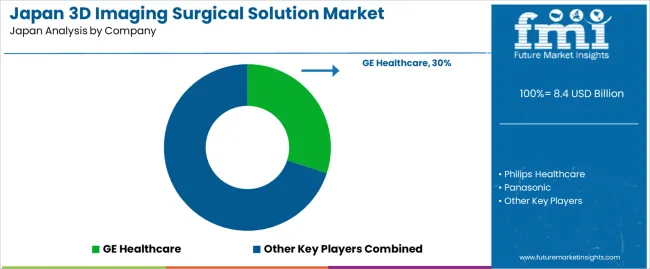
Demand for 3D imaging surgical solutions in Japan is growing as the country’s healthcare system increasingly focuses on precision medicine and minimally invasive surgical techniques. With an aging population and the need for advanced healthcare solutions, Japanese hospitals and surgical centers are adopting 3D imaging technologies to improve surgical planning, enhance accuracy, and reduce recovery times. The demand for such solutions is also supported by the rising prevalence of complex surgeries in fields like orthopedics, neurosurgery, and cardiology, where detailed visualization is critical.
GE Healthcare leads the Japanese industry with a 30.0% share, offering a broad range of 3D imaging solutions designed to meet the needs of modern surgery. Their advanced systems are widely used for both diagnostic and surgical applications. Other key players in this industry include Philips Healthcare, Panasonic, Lockheed Martin, and Able Software, all of which provide specialized imaging solutions tailored to the evolving demands of the Japanese healthcare sector. These companies focus on delivering high-quality, reliable systems that help surgeons perform complex procedures with greater precision.
The drivers of demand include Japan’s emphasis on improving healthcare outcomes, the expansion of robotic-assisted surgeries, and the increasing adoption of high-tech surgical tools that enhance visualization. The industry is further supported by government and private sector investments in healthcare infrastructure. Despite challenges such as high initial costs and the need for seamless integration with existing systems, the demand for 3D imaging surgical solutions in Japan is expected to continue growing, fueled by technological advancements and the ongoing push for higher standards in surgical care.
| Items | Values |
|---|---|
| Quantitative Units | USD billion |
| Technology Type | Stereoscopy, Auto-stereoscopy, Volumetric Display, Holography, Anaglyphy |
| Imaging Solutions | 3D Rendering, Layout and Animation, Image Reconstruction, 3D Modelling, 3D Scanning |
| End User | Hospitals, Specialty Clinics, Ambulatory Surgical Centers |
| Regions Covered | Kyushu & Okinawa, Kanto, Kinki, Chubu, Tohoku, Rest of Japan |
| Key Players Profiled | GE Healthcare, Philips Healthcare, Panasonic, Lockheed Martin, Able Software |
| Additional Attributes | Dollar sales by technology type, imaging solutions, and end-user categories, regional adoption trends, competitive landscape, advancements in 3D imaging technologies for surgery. |
The global demand for 3D imaging surgical solution in Japan is estimated to be valued at USD 8.4 billion in 2025.
The demand for 3D imaging surgical solutions in Japan is projected to reach USD 13.3 billion by 2035.
The demand for 3D imaging surgical solution in Japan is expected to grow at a 4.7% CAGR between 2025 and 2035.
The key product types are stereoscopy, auto-stereoscopy, volumetric display, holography and anaglyphy.
In terms of imaging solutions, 3D rendering segment to command 43.0% share in 2025.






Our Research Products

The "Full Research Suite" delivers actionable market intel, deep dives on markets or technologies, so clients act faster, cut risk, and unlock growth.

The Leaderboard benchmarks and ranks top vendors, classifying them as Established Leaders, Leading Challengers, or Disruptors & Challengers.

Locates where complements amplify value and substitutes erode it, forecasting net impact by horizon

We deliver granular, decision-grade intel: market sizing, 5-year forecasts, pricing, adoption, usage, revenue, and operational KPIs—plus competitor tracking, regulation, and value chains—across 60 countries broadly.

Spot the shifts before they hit your P&L. We track inflection points, adoption curves, pricing moves, and ecosystem plays to show where demand is heading, why it is changing, and what to do next across high-growth markets and disruptive tech

Real-time reads of user behavior. We track shifting priorities, perceptions of today’s and next-gen services, and provider experience, then pace how fast tech moves from trial to adoption, blending buyer, consumer, and channel inputs with social signals (#WhySwitch, #UX).

Partner with our analyst team to build a custom report designed around your business priorities. From analysing market trends to assessing competitors or crafting bespoke datasets, we tailor insights to your needs.
Supplier Intelligence
Discovery & Profiling
Capacity & Footprint
Performance & Risk
Compliance & Governance
Commercial Readiness
Who Supplies Whom
Scorecards & Shortlists
Playbooks & Docs
Category Intelligence
Definition & Scope
Demand & Use Cases
Cost Drivers
Market Structure
Supply Chain Map
Trade & Policy
Operating Norms
Deliverables
Buyer Intelligence
Account Basics
Spend & Scope
Procurement Model
Vendor Requirements
Terms & Policies
Entry Strategy
Pain Points & Triggers
Outputs
Pricing Analysis
Benchmarks
Trends
Should-Cost
Indexation
Landed Cost
Commercial Terms
Deliverables
Brand Analysis
Positioning & Value Prop
Share & Presence
Customer Evidence
Go-to-Market
Digital & Reputation
Compliance & Trust
KPIs & Gaps
Outputs
Full Research Suite comprises of:
Market outlook & trends analysis
Interviews & case studies
Strategic recommendations
Vendor profiles & capabilities analysis
5-year forecasts
8 regions and 60+ country-level data splits
Market segment data splits
12 months of continuous data updates
DELIVERED AS:
PDF EXCEL ONLINE
Demand Side Management Market Size and Share Forecast Outlook 2025 to 2035
Demand Response Market Analysis - Size, Share, and Forecast Outlook 2025 to 2035
North America Shipping Supplies Market Trends – Innovations & Growth 2024-2034
Demand of Kozani Saffron in Greece Analysis - Size, Share & Forecast 2025 to 2035
Demand of No-acid Whey Strained Dairy Processing Concepts in European Union Size and Share Forecast Outlook 2025 to 2035
Demand for Bronte Pistachio in Italy Analysis - Size, Share & Forecast 2025 to 2035
Demand and Trend Analysis of Gaming Monitor in Western Europe Size and Share Forecast Outlook 2025 to 2035
Demand and Trend Analysis of Gaming Monitor in Korea Size and Share Forecast Outlook 2025 to 2035
Demand and Trend Analysis of Gaming Monitor in Japan Size and Share Forecast Outlook 2025 to 2035
Glycine Soja (Soybean) Seed Extract Market Size and Share Forecast Outlook 2025 to 2035
Demand and Trend Analysis of Yeast in Japan - Size, Share, and Forecast Outlook 2025 to 2035
Demand of Pistachio-based desserts & ingredients in France Analysis - Size, Share & Forecast 2025 to 2035
Western Europe Men’s Skincare Market Analysis – Forecast 2023-2033
Demand and Trends Analysis of Stevia in Japan Size and Share Forecast Outlook 2025 to 2035
Japan Women’s Intimate Care Market Trends – Growth & Forecast 2024-2034
Demand and Trend Analysis of Fabric Stain Remover in Korea Size and Share Forecast Outlook 2025 to 2035
Demand and Sales Analysis of Paper Cup in Korea Size and Share Forecast Outlook 2025 to 2035
Demand and Sales Analysis of Paper Cup in Western Europe Size and Share Forecast Outlook 2025 to 2035
Demand of MFGM-enriched Powders & RTDs in European Union Size and Share Forecast Outlook 2025 to 2035
Demand and Sales Analysis of Paper Cup in Japan Size and Share Forecast Outlook 2025 to 2035

Thank you!
You will receive an email from our Business Development Manager. Please be sure to check your SPAM/JUNK folder too.
Chat With
MaRIA